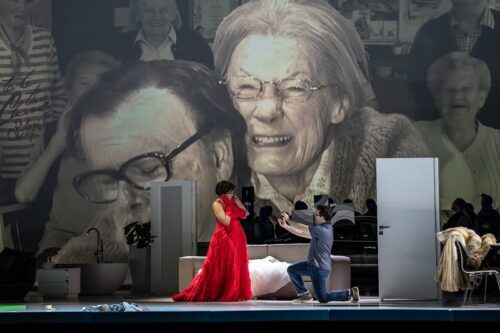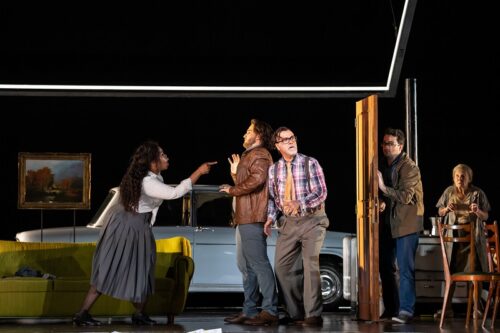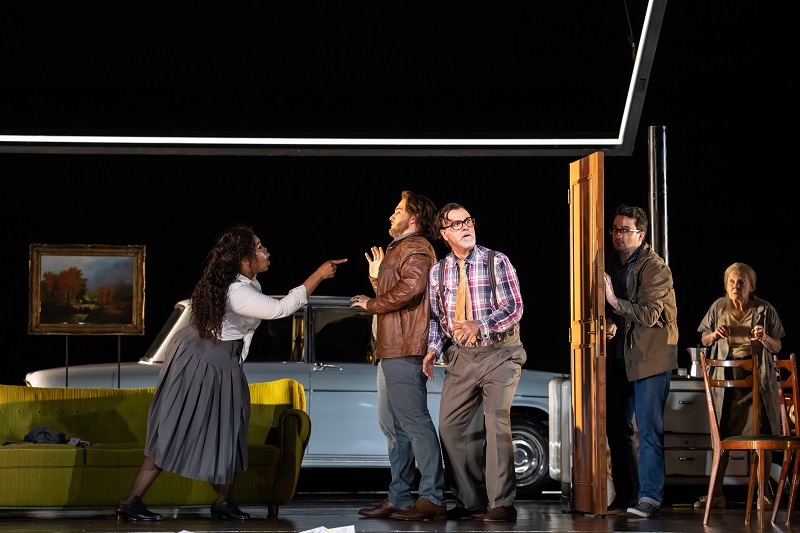 United Kingdom Donizetti, Don Pasquale: Soloists, Chorus and Orchestra of the Royal Opera House, Covent Garden / Giacomo Sagripanti (conductor). Royal Opera House, Covent Garden, 3.5.2022. (CC)
United Kingdom Donizetti, Don Pasquale: Soloists, Chorus and Orchestra of the Royal Opera House, Covent Garden / Giacomo Sagripanti (conductor). Royal Opera House, Covent Garden, 3.5.2022. (CC)

Production:
Director – Damiano Michieletto
Revival Director – Daniel Dooner
Set designer – Paolo Fantin
Costume designer – Agostino Cavalca
Lighting designer – Alessandro Carletti
Video designers – rocafilm
Cast:
Don Pasquale – Lucio Gallo
Ernesto – Xabier Anduaga
Doctor Malatesta – Andrzej Filończyk
Norina – Pretty Yende
A Notary – Thomas Barnard
Maid – Jane Evers
The first revival run of Damiano Michieletto’s production of Donizetti’s sparkling 1843 opera buffa Don Pasquale (revived here by Daniel Dooner) finds the title role shared between Sir Bryn Terfel and – as in this performance – Lucio Gallo. Terfel triumphed in 2019 (review here): it is a role that suits his talents to a tee. Gallio’s take is perhaps less characterful: the comedy is less in-your-face, while the vocal side is less pronounced.
Revisiting Michieletto’s production confirms the impression that it is, to put it politely, ‘busy’ … video projections and occasionally amusing puppetry, plus flashback scenes to Don Pasquale’s youth all counterpoint the wall-less house (light-strip frame and unattached doors). The production tries too hard, with its fashion references, its video juxtapositions of characters into natural woodland, its purported investigation of how our living spaces affect us on a deep, attachment level.
The moment of violence – the slapping by ‘Sofronia’ of Pasquale – lost its impact here, symbolic of the whole perhaps. For all of its cleverness, its onstage cars (there’s an upgrade as Norina takes charge) set against the prevailing empty space, the changes in lighting to conjure dream-like recollections and so on, the production itself feels empty. One viewing, and the attention was almost wholly diverted to the music, to Giacomo Sagripanti’s excellence in the pit. This was truly the evening’s saving grace: the orchestra possessing needle-sharp ensemble and a chameleon’s ability to change mood instantly.

Pretty Yende impressed mightily as Violetta at Covent Garden recently (review here); her Norina/Sofronia was sadly a little less of an event. Yende took a while to warm into the part. Her cavatina ‘Quel guardo il cavaliere’ was not quite fully inhabited, despite some fabulously characterful contributions from the conductor. Plus, her voice was generally too tremulous, and, while Verdi’s heroine Violetta has her agile moment in the first act and Yende was then completely prepared, here she sounded ill at ease for a significant amount of time. As the night progressed, the facility and sound clicked in and moved towards their maximal potential, but it was too easy to be distracted, to find oneself tracking Yende’s growth into the part. Yende cedes to Zuzana Markovà in the role for the Terfel nights.
Don Pasquale himself appeared as a different person in every sense. It was, of course – Lucio Gallo as against Terfel – but the character was lower on humour, and if the intent was to bring our attention to the human and most specifically to human frailty (Don Pasquale appears in a wheelchair at the end, his cruel fate an old folk’s home), it missed the mark somewhat. Gallo is a very experienced singer and one could feel his confidence throughout the performance, but gestures intended as comedic regularly came across rather flat. The Ernesto, though, was the fine Xabier Anduaga, whose voice fits Donizetti’s mode of expression well (a future major engagement is, in fact, more Donizetti, Nemorino in L’elisir d’amore at the Met in January next year). He is ardent, his voice has a core strength that allows for the more passionate moments, though his basic sound is fairly light.
Doctor Malatesta was baritone Andrzej Filończyk and how well the role suits him was shown in his performance. If the patter duet was more effecting when sung previously by Terfel and Markus Werba, it still provided delight, and Filończyk’s stage presence enabled his character to blossom nicely.
As the Notary, bass Thomas Barnard (who is also a member of the Royal Opera House Chorus and has taken a string of minor roles previously) was brilliant, judging the role to perfection. Actress Jane Evers takes up the hilarious role of the silent maid again and offers light relief in this production.
Donizetti’s score was the star this time, triumphing over the fussiness of the production and the slightly uneven vocals, carried by the excellence of the Royal Opera House musicians in the pit. Despite the staging, it remains well-nigh impossible not to enjoy the evening.
Colin Clarke
